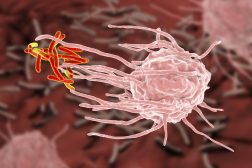Definition
noun
A short-term change in the electrical potential on the surface of a cell (e.g. a nerve cell or muscle cell) in response to stimulation, and then leads to the transmission of an electrical impulse (nerve impulse) that travels across the cell membrane.
Supplement
The action potential allows nerve cells to transmit a signal over a distance. An action potential is described as all-or-none, since they either occur fully or they do not occur at all.
The course of the action potential can be divided into five phases:
- rising phase
- peak phase
- falling phase
- undershoot phase
- refractory period
See also: nerve impulse, graded potential







